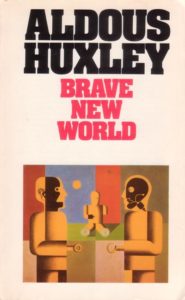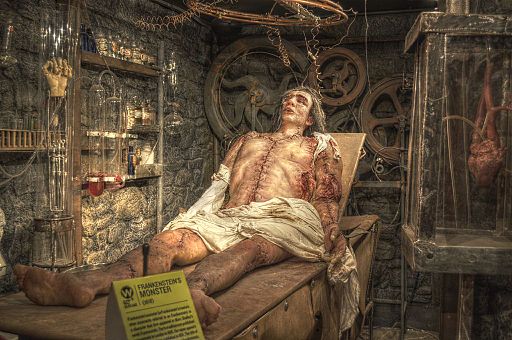Continuing The Horror Conversation
 Of necessity, I’m going to be relating a great deal of personal experience in this post. But in the end, I hope to bring my subjective reflections to some sort of general understanding about the horror genre.
Of necessity, I’m going to be relating a great deal of personal experience in this post. But in the end, I hope to bring my subjective reflections to some sort of general understanding about the horror genre.
Make no mistake: I am friends with Mike Duran, our guest the past two Fridays and author of Christian Horror. It would be easy to assume otherwise because we’ve had our share of lively online debates. Yes, debates. We’ve had a few in-person ones too, because we’re in the same writing group and see each other from time to time.
In addition, Mike has taught me a lot. In fact he has played a part in the change in my attitude toward horror. Seven years ago I wrote thoughts like these:
I hear that designation and my first thought is “horror.” OK, that reaction takes place on several levels—horror, the genre, for one and Horror! a Christian horror story? on another.
The first level. Is [a certain specific Christian novel] indeed a horror story? I’m maybe the worst person to answer this question since I’ve made a point not to read horror. In the past I objected to the idea that Horror as a genre, defined by Wikipedia as “that which exists to generate fear,” could, in fact, be Christian.
Then, in answer to a comment (by Mike Duran actually) I said this:
how do you categorize a book that calls itself Christian horror but doesn’t scare you? I mean, is that good writing because the Christian message gives hope, or poor writing because it was supposed to scare you?
In truth, the two terms, as it stands now, seem incongruous to me.
Through conversations/debates, I’ve relented. I now believe writers can utilize horror for other reasons than to generate the adrenaline rush created by fear. I believe some can genuinely use the genre as soul-searching mechanisms to understand evil and good.
As more Christians wrote “supernatural suspense,” a euphemism for horror, I willingly introduced some of their titles to readers through the Christian Science Fiction And Fantasy Blog Tour. Some, to be honest, weren’t scary. One was an intriguing story I particularly liked, filled with more mystery than fear. But there came a day I’d had enough. Mind you, I hadn’t had a lot, but I’d had enough. I had read several well-written books that took me into dark worlds. Some measure of light surfaced in the end, but I mostly felt relief. Relief that the books were done, that I didn’t have to dive into the ugliness again.
I decided I didn’t want to read those kinds of books any more. They didn’t put me in a good spiritual place. I didn’t feel closer to God, nor did I understand the reality of evil in a new way (which had happened when I read This Present Darkness by Frank Peretti years ago).
Simply put, the books didn’t give me a positive reading experience.
Mind you, I’ve read some “gritty” stuff. For example I read Emile Zola’s Germinal, “an uncompromisingly harsh and realistic story of a coalminers’ strike in northern France in the 1860s” (Wikipedia). The novel is known for its realistic depiction of poverty, oppression, and violence.
 I’ve also read Exodus by Leon Uris, a novel depicting some of the horrific treatment of Jews in Europe at the hands of the Nazi—including life and death in concentration camps and during pogroms. In accord with the latter, I’ve read the real life version, The Rise and Fall of the Third Reich by William L. Shirer, and Corrie ten Boom’s The Hiding Place which recounts the death of both her father and her sister while they were in the custody of the Nazis.
I’ve also read Exodus by Leon Uris, a novel depicting some of the horrific treatment of Jews in Europe at the hands of the Nazi—including life and death in concentration camps and during pogroms. In accord with the latter, I’ve read the real life version, The Rise and Fall of the Third Reich by William L. Shirer, and Corrie ten Boom’s The Hiding Place which recounts the death of both her father and her sister while they were in the custody of the Nazis.
 Then there’s John Steinbeck’s Grapes of Wrath or William Golding’s Lord of the Flies, George Orwell’s Nineteen Eighty-Four or Aldous Huxley’s Brave New World.
Then there’s John Steinbeck’s Grapes of Wrath or William Golding’s Lord of the Flies, George Orwell’s Nineteen Eighty-Four or Aldous Huxley’s Brave New World.
All of these I consider to be important works. I’m glad I read them though there were hard parts that sometimes made me feel sick and even made me cry. Reading to me is not an occasion to close my eyes to the realities of the world. Without a doubt, I am better for knowing about other people’s struggles and even about the horror in the world.
Yes, horror. There’s that word.
But here’s something I think is significant: I am not seeking out novels about people dying in concentration camps or suffering because of the Great Depression. I know those things happened, I’ve learned from reading the stories, but I don’t need to keep reading the stories.
In many ways, I feel the same about horror. Apparently the writers of Christian horror (and perhaps some non-Christian writers) believe their stories explore the conflict between good and evil.
In Mike Duran’s post “Horror Is Based On A Biblical Worldview, Part 2,” he said
many of our “standard” Bible stories contain disturbing and horrific elements. Noah’s Flood, the plagues of Egypt and the Passover (especially the angel of death slaughtering Egypt’s firstborn), Elisha and the prophets of Baal, Saul and the Witch of Endor, the Slaughter of the Innocents, and perhaps the greatest of all, the Book of Revelation with its depiction of cosmological upheaval, plagues, the antichrist, and the Great White Throne Judgment.
I’ve questioned that those stories qualify as horror, but if I were to concede this point, what then would be the purpose of reading fictional horror? I mean, isn’t it possible to learn about the real thing and therefore not have to read a make-believe account?
And if I’m right that these are not horror stories, I still question the need to explore good and evil through the avenue of horror. If a person looks at good and evil in the Bible, is a fictional look at it adding to our body of knowledge? For certainly, whether someone thinks the Bible contains horror or not, I think we all can agree that it reveals a genuine struggle between good and evil.
I realize that “knowledge” is not the end game of fiction, but perhaps experience is. All the more reason, I think, for me to avoid reading Christian horror. I see no value in experiencing the horrors of demonic possession or oppression or any of the other evils from which Jesus Christ set me free.
In his post, Mike mentioned a passage in Colossians that targets the notion that we can combat temptation by compiling a list of do’s and don’ts:
If with Christ you died to the elemental spirits of the world, why, as if you were still alive in the world, do you submit to regulations—“Do not handle, Do not taste, Do not touch” (referring to things that all perish as they are used)—according to human precepts and teachings? These have indeed an appearance of wisdom in promoting self-made religion and asceticism and severity to the body, but they are of no value in stopping the indulgence of the flesh. (Col. 2:20-23, ESV)
No doubt about the intent here: a list of do’s and don’ts is no way to handle potential temptation. But Paul doesn’t stop here, as if to say, so go ahead and dive right into the “elemental things of this world.” Or, for the sake of this discussion, go ahead and explore evil.
Rather, he starts out the next chapter by saying
Therefore if you have been raised up with Christ, keep seeking the things above, where Christ is, seated at the right hand of God. Set your mind on the things above, not on the things that are on earth. (Col. 3:1-2, NASB)
Paul’s counter to the legalistic approach was for believers to readjust our focus, to explore, if you will, the things above.
Which is why I generally ask in these discussions about horror, why we believers aren’t doing more in our fiction to show the light—God’s light and truth.
Am I saying that my personal experience should become normative for Christians? No, I am not! I’m saying, some Christians might be choosing against horror for reasons other than that they are “turning away” from the evil in the world. We simply choose to explore evil in Scripture rather than in fiction.
In fact, because the world is steeped in evil and we are surrounded by it in an ever-increasing flood, some people turn to fiction for a glimmer of hope. Maybe they should be turning to the Bible for that, also. I’m not the judge here.
But I think the issue of horror does not have a clear-cut “thou shalt” or a “thou shalt not” directive. I’m not pointing fingers at writers or readers of horror, declaring them to be less Christian for wading into waters I choose to leave un-churned.
At the same time, I think there are valid reasons for choosing to pick up and read books other than horror. I’ll stand behind my decision without extrapolating from it to All The Rest Of All Christians Out There. It’s kind of what I think freedom in Christ allows.










































I appreciate the questions you’ve raised here, as well as the desire not to judge others or set rules. I enjoy a good scare now and then, but for me that means much more of a ghost story than anything else.
I think the fast pace of the genre is the biggest allure for this generation. Horror seizes the attention. If the story is complex it can be effective, but it seems more and more the story is either a dive into darkness or simply scare after scare.
Frankly, I’m so bored with today’s novels! I can’t find many which keep me reading to the end. I wonder if it’s because my attention span has shortened or because the stories have gotten repetitive. So I’m going back to my nonfiction loves and the classics in fiction. Maybe a good soak will revive me.
It’s good to challenge each other. I appreciate the discussion.
This seems like a roundabout way to say: I don’t like this because of reasons, but you do you.
A few weeks ago I tried to watch The Babadook. I can see why people think it’s good — it’s psychological rather than gore — but I was about halfway through when it began creeping into the bedroom with its croaky voice, and I was riding the Nopetopus off into the sunset. On the flip side, I like the anime Ghost Hunt, which is pretty freakin’ creepy, but it has that mystery angle of trying to figure out what the apparition is and how to get rid of it.
I’m not sure how they can show the light more. I mean, a lot of the problem of current Christian spec fic is that they don’t really engage with anything but the coziest, surface-level form of showing the evangelistic journey. I remember reading a blurb for a fantasy series with 9 books (Allon) which trumpeted that it was ideal for homeschoolers and Christian educators. It’s hard to want to engage with a book like that.
I think the idea of Christian horror is good in one sense that it’s possible to make Christian fiction more complex and adult in a plot sense. I can understand disliking gore or hard stuff, and not wanting a diet of it, but the problem with the light side is that it has all the substance of a cozy mystery about a detective and his cats. I don’t think it’s impossible to make clean, complex fiction, but I haven’t seen many good examples of it.
Maybe we could split the difference and have a horror featuring a detective and his cats? MOAR KITTEHS in fiction!
Challenge accepted.
Ah, David, you missed the point–unless you think there is no substance to Light. The fact that there has been much cozy in the stories that show Light actually illustrates my point. I think there is much we still ought to be exploring in depth in regard to God, so I’m not sure why we want to write stories that explore evil more.
Becky
Not sure how we can do that in terms of speculative fiction. The examples you mentioned in your linked posts were inspirational biographies. You’d have to show in more concrete terms what you mean. I can think of ways to write about Christians, but writing about God’s love beyond simple evangelism stumps me.
Well, I suggest by starting with C. S. Lewis and see how much truth he put in his stories–from Narnia to the space trilogy to books like Screwtape Letters, The Great Divorce, and Til We Have Faces. He went far beyond the one note song and revealed more of God’s character, even in his letter-exchange novel between two demons.
Becky
I completely agree! This is how I feel about horror, too. I’d rather keep my brain way away from stuff that makes me feel icky and creeped out…my imagination is too active and would feed off it, and I don’t think it would be healthy.
I can’t get the thumb to work, but I agree, Bethany. I don’t think it’s healthy to go where our minds our fixed on demonic things, putting things of God at abeyance. And the thing is, no one can determine this point for anyone else. It’s important that we cultivate enough self-awareness that we can recognize that point for ourselves.
Becky
In response to the contention that we don’t need/want fictional evil because we can already read about real evil in the Bible: doesn’t that apply to not only evil, but absolutely everything? I daresay the Bible contains representative examples of just about the whole of human experience, so following that reasoning, we’d have no call to write or read any other books at all!
So, why DO we read other books besides the Bible? A good book, written from an appropriate worldview, doesn’t contradict the Bible, so you might argue that it is only saying things the Bible already said. And yet, sometimes there is value in expanding, applying, and recontextualizing the principles we see in the Bible. Sometimes extra-Biblical literature helps us understand the Bible in ways that merely reading the Bible does not. Not that it adds new information (I’m not questioning the Bible’s inspired authority here), but it gives us a different angle on what the Bible has been saying all along. Or maybe the emotional/visceral appeal of certain literature helps us take something that was “head knowledge” when we read it in the Bible, and make it “heart knowledge.” And if it’s worth exploring Biblical topics like love and faith and heroism in this way, then why not evil?
For that matter, how do you really explore the hope of Christianity — how do you explore victory over evil — without first putting evil on the screen? You have to see a demon-possessed man before you can see the demon cast out. You have to see a dead man before you can see him raised to life.
I agree with much of what you said, Writer, and even illustrate this point in my own post. If you recall, I implied that I saw the reality of evil in a new way when I read Frank Peretti’s This Present Darkness. In other words, I agree with you that stories can bring truth to bear in our hearts. Prince Caspian did that for me when Lucy understood she was to follow Aslan though the others didn’t recognize his presence or believe she had heard his voice. It was a powerful truth that I got through fiction, though the Bible says the same thing in other ways and using different words. Essentially fiction showed the truth.
So I’m not saying there is no place in fiction. But I don’t think every aspect of the human experience needs to be explored. Some things we understand because of our own experience. True, we might be intrigued by someone else’s experience, and we might want to compare it to ours. But do we have to explore those things? What constitutes a required exploration?
If there is such a thing, I think Paul defined it in Colossians 3:1. I want to know why we don’t fight hard to have an exploration of God’s nature, His character. Isn’t that far more relevant than understanding evil better? After all, evil is not foreign to us. God, on the other hand, is this infinite, transcendent being who is so unfathomable the Psalmist says
We could write volumes and volumes and never reach the end of who God is and how He chooses to interact with His creation, but sadly we seem to write the same story over and over rather than going in depth to study the light. The answer to shallow stories is not to change the focus, I don’t think, and start writing dark stories.
Becky
I’m torn. On one hand, JRR Tolkien says (through Elrond of Rivendell) that “it is perilous to study too deeply the arts of the Enemy, for good or for ill.” Yet the blazing center of God’s glory is the cross of Christ’s suffering, the most horrific event that has ever happened…and we are encouraged to dwell on that event.
There is a good reason why Tolkien said what he did, yet we know that the darker the evil, the more brightly good shines. So it seems to me that it all comes down to why. In some some books, horror is showcased only for a thrill or to glorify evil. In others, it is used to showcase and glorify good.
What am I missing here? There may be a valuable distinction between describing the arts of the enemy (the depraved philosophy and function of evil) and describing the end result of those arts (the horrific loss of life).
I guess the answer isn’t black and white, which is reflected in your non-judgmental conclusion Becky. Thanks for a great thought-stimulating post…
Before becoming a Christian, I read works of H. P. Lovecraft, Clive Barker, and other horror writers. I also stayed up late almost every Friday night to watch horror movies on Night Owl Double Chiller. Having exposed myself to so much scary material, I have learned that most stories follow one of two metaphysical worldviews.
The first worldview one may encounter is that good and evil are equally matched. What makes this truly horrific is the sense that good will never win in the end, but will eternally be in a struggle with evil.
The second worldview is that evil will win. This is particularly true of Lovecraft’s works. It is the utter helplessness, hopelessness, and futility of human endeavor to stop evil that makes such stories terrifying. Although a Christian reader may read such tales with discernment, the reader will not glean anything of sanctifying value from it.
The challenge for the Christian writer is to avoid such worldview confusion. There may be human futility against evil in the story, but God wins. Satan himself may enter the tale, but he is no match for his Creator. No matter what horror is in a work of Christian fiction, there is always hope. My model for such a writing would be Ray Bradbury’s Something Wicked This Way Comes (not the terrible Disney movie, but the book), in which some truly scary things happen, but love wins in the end.
I would add one more example from the horror genre that Christians can use as a good example. Although some may put Signs in the category of science fiction, I think it fits better in the realm of horror (in the same way than many a Doctor Who episode fits horror better than science fantasy). For most of the film, Mel Gibson’s character is convinced that the God he used to worship had abandoned him. With the addition of an invisible alien menace, Gibson feels helpless, hopeless, and unable to save himself or his family. Yet, the end of the movie brightly shines with the providence of God having been intricately weaved throughout the story… and you didn’t even know it was there until the end.